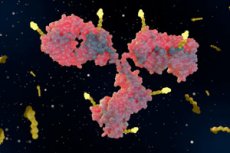New publications
Artificial Intelligence Creates Molecular 'Missiles' to Target Cancer Cells
Last reviewed: 27.07.2025

All iLive content is medically reviewed or fact checked to ensure as much factual accuracy as possible.
We have strict sourcing guidelines and only link to reputable media sites, academic research institutions and, whenever possible, medically peer reviewed studies. Note that the numbers in parentheses ([1], [2], etc.) are clickable links to these studies.
If you feel that any of our content is inaccurate, out-of-date, or otherwise questionable, please select it and press Ctrl + Enter.

Personalized cancer treatment is reaching a new level as researchers have developed an AI platform that can now customize protein components and “arm” a patient’s immune cells to fight cancer.
A new method described in the journal Science demonstrates for the first time that it is possible to design proteins on a computer that can redirect immune cells to kill cancer cells using pMHC molecules.
This radically reduces the time it takes to find effective molecules for cancer therapy – from several years to several weeks.
“We are essentially creating a new pair of eyes for the immune system. Current personalized cancer treatments are based on finding so-called T-cell receptors in the patient’s or donor’s immune system that can be used in therapy. This is a very long and complex process. Our platform designs molecular keys for recognizing cancer cells using AI, and does so at incredible speed, allowing a candidate molecule to be developed in just 4–6 weeks,” explains Timothy P. Jenkins, Associate Professor at the Technical University of Denmark (DTU) and the last author of the study.
Targeted missiles against cancer
The AI platform, developed jointly by specialists from DTU and the Scripps Research Institute (USA), solves one of the key problems in the field of immunotherapy: creating targeted methods for treating tumors without damaging healthy tissue.
Typically, T cells naturally recognize cancer cells by responding to specific peptides displayed on the cell surface by pMHC molecules. Translating this knowledge into therapy is a slow and difficult process, especially because individual T cell receptor diversity prevents the development of universal, personalized treatments.
Strengthening the body's immune system
In the study, the scientists tested the platform’s effectiveness on a known target, NY-ESO-1, which is present in various types of cancer. The team successfully engineered a minibinder that tightly bound to NY-ESO-1 pMHC molecules.
When this protein was inserted into T cells, it created a new cell construct that the researchers called IMPAC-T cells. These cells effectively directed T cells to kill cancer cells in lab experiments.
“It was incredibly exciting to see how mini-binding proteins, designed entirely on a computer, work so efficiently in the lab,” says postdoc Christoffer Haurum Johansen, co-author of the study and a researcher at DTU.
The scientists also used the platform to engineer proteins to target a cancer target identified in a patient with metastatic melanoma, and successfully created active compounds for this purpose as well, proving that the method can be applied to new individual cancer targets.
Virtual Security Check
The key element of the innovation was the creation of a virtual safety test. Scientists used AI to screen the minibinders they created, comparing them with pMHC molecules present on healthy cells. This allowed them to filter out potentially dangerous molecules before experiments began.
"Precision in cancer treatment is crucial. By predicting and eliminating cross-reactions already at the design stage, we were able to reduce risks and increase the likelihood of creating a safe and effective therapy," explains DTU Professor and study co-author Sine Reker Hadrup.
Treatment - after five years
Jenkins estimates it will take up to five years to conduct the first human clinical trials. Once implemented, the method will resemble existing methods that use genetically modified T cells, called CAR-T therapy, used to treat lymphoma and leukemia.
First, blood is drawn from the patient, as in a normal test. From this blood, immune cells are extracted and modified in the lab by injecting them with AI-designed minibinders. The enhanced immune cells are then returned to the patient, and act as guided missiles, precisely finding and destroying cancer cells in the body.
